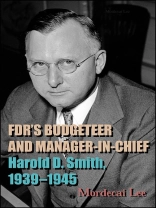In this book, Mordecai Lee provides a long-overdue examination of a key member of FDR’s administration. Harold D. Smith was FDR’s budget director from 1939 through to Roosevelt’s death in 1945. In that capacity, he was also the de facto manager-in-chief of the federal government. During his tenure, he reformed and expanded the Bureau of the Budget (now Office of Management and Budget) into an elite cadre of apolitical experts dedicated to serving the institutionalized presidency. He pursued management reforms, reorganization, policymaking, economic planning, public relations, and a pinch of politics. In addition, Smith was a leader in professionalizing the emerging field of public administration, cofounding the American Society for Public Administration in 1939 and serving as its second president. A major figure in his time, he appeared on the cover of
Time magazine in 1943, and FDR considered him irreplaceable. In response to Smith’s offer to resign in 1944, Roosevelt lightheartedly replied, ‘I would no more accept your resignation than fly by jumping off a roof. You are essentially persona grata and doing a grand job. If you talk any more about resigning, I will act. A Marine Guard from Quantico will be stationed at your side during every minute of every twenty-four hours.’
İçerik tablosu
List of Illustrations
Abbreviations
Preface
Introduction
1. FDR’s ‘Great Reorganizer, ‘ April–July 1939
2. War in Europe, Empowering BOB, and First Budget, July–December 1939
3. Spending, Reorganization, Defense, and Third Term Campaign, 1940
4. Neither War nor Peace, plus Business as Usual, 1941
5. The First Year of the War, 1942
6. The Second Year of the War, 1943
7. The Third Year of the War and Fourth Term-Campaign, 1944
8. FDR’s Fourth Term, 1945
Conclusion: FDR’s
Other Assistant President
Notes
Bibliography
Index
Yazar hakkında
Mordecai Lee is Professor Emeritus at the University of Wisconsin–Milwaukee. His books include
See America: The Politics and Administration of Federal Tourism Promotion, 1937–1973;
Get Things Moving! FDR, Wayne Coy, and the Office for Emergency Management, 1941–1943;
The Philosopher-Lobbyist: John Dewey and the People’s Lobby, 1928–1940; and
The First Presidential Communications Agency: FDR’s Office of Government Reports, all published by SUNY Press.












